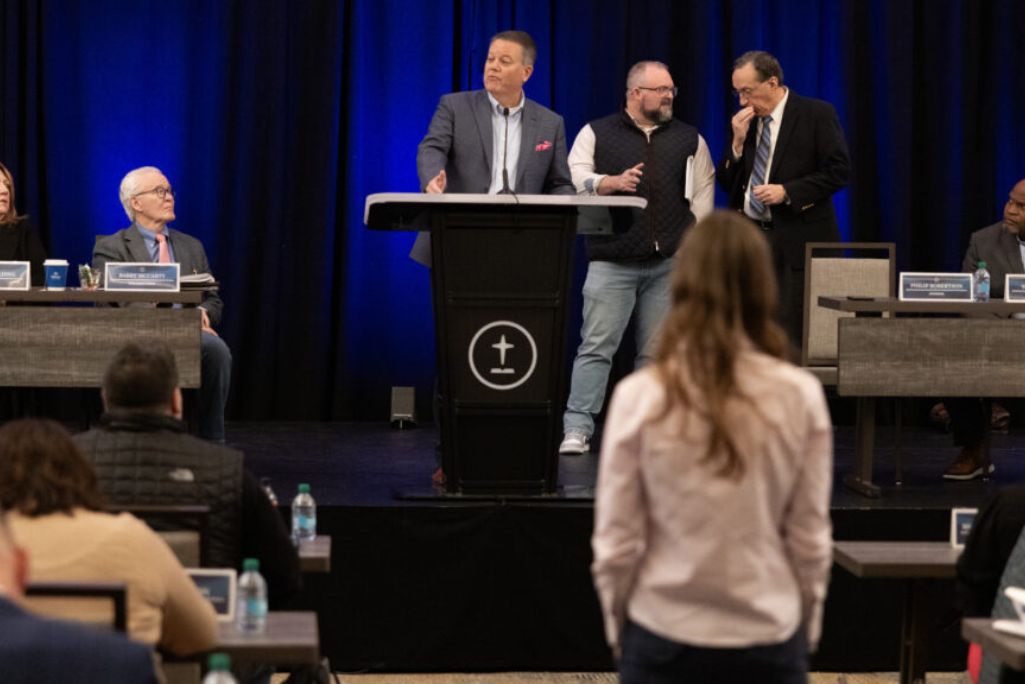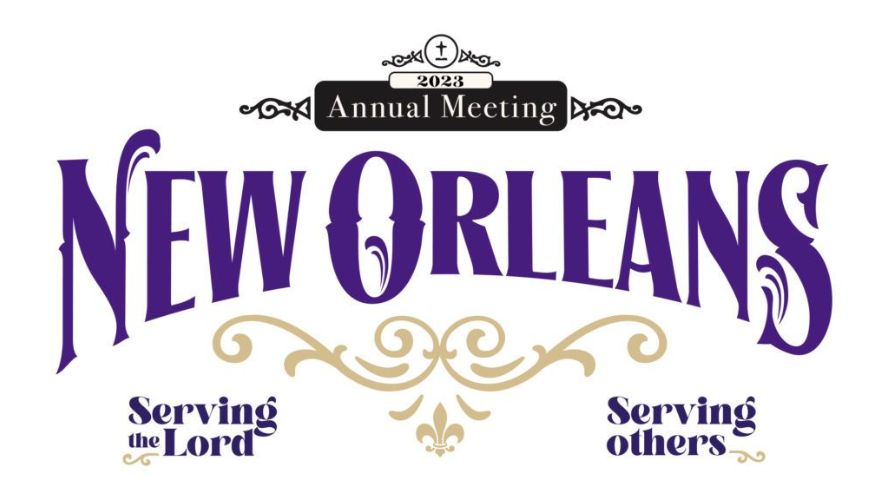
Southern Baptist Convention (SBC) Executive Committee (EC) Chairman Philip Robertson speaks during a plenary session at the EC meeting in Nashville on Feb. 18.
NASHVILLE (BP) — Executive Committee (EC) members approved a recommendation Tuesday morning (Feb. 18) for a $190 million 2025-26 Southern Baptist Convention (SBC) Cooperative Program (CP) Allocation Budget that includes $3 million earmarked for anticipated legal costs.
The recommendation moves forward to messengers for a vote at the SBC annual meeting to be held in Dallas in June.
EC members spent approximately 33 minutes of the 46-minute report brought by the Committee on Convention Finances and Stewardship discussing the $3 million allocation’s potential pitfalls as well as other options. In its separate meeting Monday, Feb. 17, the standing committee discussed the issue (among others) in more than two hours of executive (closed) session.
In his address to trustees Monday, EC President Jeff Iorg outlined the steps that have brought the SBC to this point, saying “bills must be paid.” Although the original 2021 motion approved the payment of legal costs from the Cooperative Program, the Executive Committee has thus far paid for those out of reserves to the tune of $13 million.
That is no longer an option, as reserves are depleted. And though the motion would eventually pass overwhelmingly, some trustees voiced the hope that other options could be found before the annual meeting.
Nick Sandefur, senior pastor of Porter Memorial Baptist Church in Lexington, Ky., agreed with Iorg on the need to use CP funds for business, including paying bills. His disagreement came with the money coming through a priority allocation while leaving current percentages in place.
The move would “strengthen the EC position in the short-term,” he said, but “provide opportunity” for church leaders looking to bypass Cooperative Program giving.
Sandefur advocated for resetting CP allocation percentages instead. Passage of the recommendation, he said, would cause money forwarded to the International Mission Board (IMB) to fall below 50% of total receipts, which conflicts with a long-held goal of Southern Baptists. Furthermore, he said, given the IMB’s current allocation of 50.41%, the move would take away more than $1.5 million from the international mission efforts.
“I would encourage our [EC] members to look at reducing funding percentages in a way that aligns with the heart of Southern Baptists,” he said.
Lamar Morin, lead pastor of Hoffmantown Church in Albuquerque, N.M., asked if the SBC’s bylaws prohibited a grassroots effort among churches to give directly toward the legal costs.
There is no prohibition on such a grassroots move nor on the EC’s calling for a special offering or gifts from individuals, Iorg explained, but the EC cannot ask churches to put the amount in its budget or compete with the Cooperative Program.
“The most challenging shortcoming of the offering approach is that we really don’t know what our future legal expenses are going to be.” Iorg said. “This is an estimated solution for next year’s budget.”
These particular legal matters could be resolved by the end of the year or into the next. Legal costs could be more. They could be less, he added.
Dani Bryson, an attorney and member of First Baptist Church in Dickson, Tenn., expressed concerns that the recommendation establishes “two dangerous precedents.”
First, it would send a message to state conventions that “designated giving is the way to go. I think that would be the response … if we do this,” she said.
Second was the potential legal ramifications should the SBC lose one of the lawsuits it currently faces.
“If we’re going to be standing before a court trying to tell them that we don’t have access to all the Cooperative Program funds … this designation sure doesn’t make that look true.”
Iorg pointed out that priority allocations are not new. However, the one in question is “definitely a new amount and a new perspective.”
Later in the meeting, EC Chair Philip Robertson reiterated Iorg’s comments from the night before that the option on the table isn’t offered out of preference, but necessity.
“Your finance committee yesterday voted overwhelmingly after robust discussion to recommend to you all today this solution. And so that’s where we are,” he said.
A slight amendment to the budget was approved when it was discovered the budget amounts for Southern Baptist Theological Seminary and Southeastern Baptist Theological Seminary had been inadvertently flipped. Otherwise, the budget recommendation passed with a handful of “no” votes.
Executive Committee members also approved recommendations for a new business and financial plan as well as reports regarding allocation and operation budgets for 2023-24 and 2024-25. Trustees also recommended a 2025-26 proposed EC and SBC Operating Budget of $12,068,300 for approval in Dallas.
In a press conference at the close of the meeting Feb. 18, Iorg was asked about specifics on the differences between the current and proposed financial plans.
“It’s hard to identify specifics because we really rewrote the entire document,” he said. “I did highlight 15 areas last night where the new plan calls for specific reporting from the boards of trustees to the Southern Baptist Convention and a heightened level of accountability and transparency based on the new plan.”
An SBC referral to “strongly request” the Executive Committee increase the IMB’s Cooperative Program percentage to 51% brought a recommendation to report that the EC “continues to work toward proposing” such a budget for 2026-27.
A referral calling to allow the Ethics & Religious Liberty Commission (ERLC) to raise its own funds outside of the SBC was declined. According to the recommendation, the EC is working in “cooperation and collaboration” with various other entities, institutions and commissions to address the issue through changes in the business and financial plan.
(EDITOR’S NOTE — Scott Barkley is chief national correspondent for Baptist Press.)


